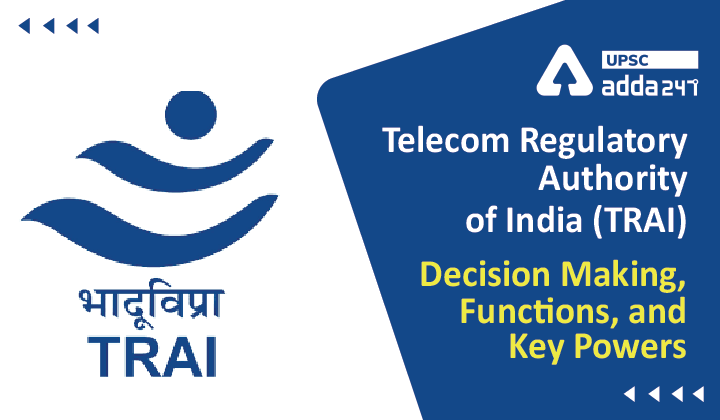Table of Contents
Telecom Regulatory Authority of India (TRAI)- Relevance for UPSC Exam
- GS Paper 2: Indian Constitution- Statutory, regulatory and various quasi-judicial bodies.
Telecom Regulatory Authority of India (TRAI) in News
- Recently, Union Minister for Communications, Electronics & Information Technology inaugurated a seminar to commemorate the 25 years-long journey of the Telecom Regulatory Authority of India (TRAI) Act.
Major Reforms in Telecom Sector
Telecom Regulatory Authority of India (TRAI)
- About: TRAI was established with effect from February 20, 1997, by the Telecom Regulatory Authority of India (TRAI) Act 1997.
- Setting Telecom Regulatory Authority of India (TRAI) was necessary after opening up of the telecommunication sector to private operators.
- TRAI Headquarters: Telecom Regulatory Authority of India (TRAI)’s headquarter is located at New Delhi.
- Legal Status: Telecom Regulatory Authority of India (TRAI) is a statutory authority set up under the Telecom Regulatory Authority of India (TRAI) Act 1997.
- Mandate: Telecom Regulatory Authority of India (TRAI)’s mandate is to regulate telecom services, including fixation/revision of tariffs for telecom services.
- These responsibilities were earlier vested in the Central Government.
Decision Making in Telecom Regulatory Authority of India (TRAI)
- Presiding Authority: The Chairperson of TRAI is responsible for organizing and presiding over the TRAI meetings. In his/her absence, the vice-chairperson of TRAI presides over the meetings.
- Decision Making: In TRAI meetings, decisions are made on various agendas by the majority vote of the members present.
- Casting Vote: In case of equality of votes, the presiding authority has the casting vote.
Key Functions of Telecom Regulatory Authority of India (TRAI)
- Recommendatory Functions: TRAI’s recommendations are non-binding in nature.
- Introduction of New Service Provider: TRAI recommends the need for and timing of introduction of new service providers and terms and conditions of the license to a service provider;
- Revocation of License: TRAI may recommend revocation of license for non-compliance of terms and conditions of license.
- Promote Competition and Efficiency: TRAI also recommends measures to facilitate competition and promote efficiency in the operation of telecommunication services to facilitate their growth.
- Non-acceptance of TRAI’s Recommendations:
- Centre sends back the recommendation for reconsideration, if it needs modification or does not accept a recommendation of TRAI.
- TRAI again forwards its recommendation to the centre after due reconsideration within 15 days.
- Other Key Functions: TRAI is responsible for Ensuring-
- Compliance: of terms and conditions of license.
- Technical compatibility and effective interconnection: between different service providers.
- Quality of Service: by laying down the standards of quality of service to be provided by the service providers.
- Timely and officially notifying the rates at which the telecommunication services within India and outside India shall be provided under the TRAI Act, 1997.
Key Powers of Telecom Regulatory Authority of India (TRAI)
- Power to seek Information: TRAI is authorized to ask any service provider to furnish in writing the information or explanation relating to its affairs as it may require.
- Inquiry Powers: The TRAI have powers to appoint one or more persons to make an inquiry in relation to the affairs of any service provider.
- Inspection Powers: TRAI has the authority to direct any of its officers or employees to inspect the books of accounts or other documents of any service provider.
- Ensuring Proper Functioning: TRAI is also entrusted with the power to issue such directions to service providers as it may consider necessary for proper functioning by service providers.
Telecom Regulatory Authority of India (TRAI) | About, Composition, Removal and Key Objectives
Telecom Regulatory Authority of India (TRAI) | About, Composition, Removal and Key Objectives




 TSPSC Group 1 Question Paper 2024, Downl...
TSPSC Group 1 Question Paper 2024, Downl...
 TSPSC Group 1 Answer key 2024 Out, Downl...
TSPSC Group 1 Answer key 2024 Out, Downl...
 UPSC Prelims 2024 Question Paper, Downlo...
UPSC Prelims 2024 Question Paper, Downlo...





